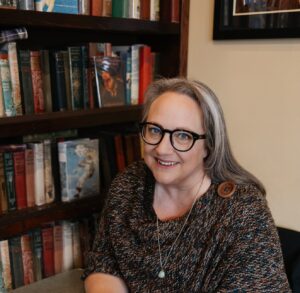 Simone Blais is visiting the Crowsnest Museum & Archives. A community made up of several small towns huddled in the Rocky Mountains, Crowsnest Pass Municipality is a long way from her home of Kelowna, British Columbia. Blais is here on a mission.
Simone Blais is visiting the Crowsnest Museum & Archives. A community made up of several small towns huddled in the Rocky Mountains, Crowsnest Pass Municipality is a long way from her home of Kelowna, British Columbia. Blais is here on a mission.
The museum’s archivist is more than happy to help, offering Blais full access to the archives. At the turn of the 20th century, Crowsnest Pass was home to a booming coal industry. The town’s archives hold countless ledgers and registers detailing the immigrants who lived, worked and built communities there. Blais knows what she’s after as she parses the boxes of 100-year-old documents. She’s searching for two names in particular: Emilio and Julia Maletta.
After a while, she draws her hands back, shocked. Her fingertips are stained black.
“I couldn’t figure out what the heck was happening, why my hands were turning black,” she recounts. “And then I realized it was coal dust. All of these miners were coming back after a shift and signing this book and leaving coal dust on the pages. Sometimes history is very tangible, you can feel it, it’s tactile.”
Sometimes history is very tangible, you can feel it, it’s tactile.
Blais, a student in King’s Master of Fine Arts in Creative Nonfiction program, has been researching Italian-Canadians in the first half of the 20th century. During the 1940s, at the height of the Second World War, the Canadian government classified these citizens as “enemy aliens.” It’s a project that hits close to home for her—the Malettas were her maternal grandparents. They lived through and experienced the direct repercussions of this time.
Crowsnest Pass was home to a large community of Italian-Canadians who built communities around the mines and railroads that stretched west, Blais’s grandparents among them. For the writer searching for something, anything, that might explain why her grandparents were designated as “enemies,” it’s a good place to start.
Today, however, she doesn’t find what she’s looking for.
On the drive home, her husband suggests she sets her sights bigger. Perhaps the provincial archives in Victoria and federal archives in Ottawa will have what she’s looking for.
This is where the Peter Mansbridge Investigative Writing Award comes in.
Earlier this year, King’s announced that a $100,000 gift from esteemed Canadian journalist Peter Mansbridge would endow a new scholarship, to be awarded annually to a student in their second year of the Master of Journalism or MFA in Creative Nonfiction program. In order to be eligible, an applicant must demonstrate that their project is investigative in nature, has strong publication potential, and that the funds required to complete the research for the project will not be covered by other means.
Blais’s project, The Stone Mason’s Wife: Fear, Fascism and Italian Family in Rural Canada was chosen from among three entrants from the MFA and MJ programs, by a jury consisting of Gillian Turnbull, Director of Writing & Publishing, Fred Vallance-Jones, Director of Journalism, and investigative author Jessica McDiarmid, BJ(Hons)’08, MFA’16. The jury “was impressed with the clarity of [Blais’s] purpose, the research plan and the work done to date. It was evident from the application that Blais had developed a focused, realistic plan to unearth long-buried information, through not only searching archives but also using Access to Information and Privacy requests and other investigative tactics,” the jury members said.
Inglis Professor Dean Jobb, Cohort Director of the Creative Nonfiction program, elaborates: “Simone submitted a detailed and ambitious research plan that will enable her to recreate the lives of her grandparents, who emigrated from Italy to Western Canada and became ‘enemy aliens,’ forced to jettison their heritage, during the Second World War. We’re delighted that the Mansbridge Award will support her as she tells this timely story of family, migration, and belonging.”
Blais said she was surprised, and delighted, to find out she was to be the first recipient of the award.
“I grew up with Peter Mansbridge, he read the news to me and my family every night. He was always a trusted source of information,” she explains. “It’s a huge honour to be the recipient of this award… it feels like standing on the shoulders of giants, in a sense. It’s a huge opportunity, but it comes with responsibility.”
When it comes to research, Blais knows her way around. She holds a diploma of journalism and public relations from Kwantlen Polytechnic University and a Bachelor of Arts in English from Simon Fraser University. Working as a journalist and editor for 15 years, she says her favourite assignments were the ones centred around community history and family—especially those that reflect the broader, sometimes untold stories of the Canadian experience.
Drawn to King’s MFA for the way its low-residency format enables her to continue working alongside the program, Blais says the program has been invaluable to her project’s development. In particular, she cites the help of her three MFA mentors—Lezlie Lowe, BA(Hons)’96, MFA’16, Wanda Taylor, BJ’08, and Ayelet Tsabari—for helping her parse out history.
“Everyone in the program was so helpful. It didn’t matter who I reached out to. The directors were phenomenal, it’s been a really great experience.”
Perhaps the most important thing this project has provided Blais, on a personal level, is a deeper understanding of her own family and what they went through. Her grandparents died before she was born—she learned their story second-hand from other family members.
Asked what she would like to know from them if they met today, she pauses for a moment, gathering her thoughts.
“I think I would want to ask them, ‘What should we remember?’”
Through her project, Blais will find out.

